☆ PuniPuni Youtube ☆
Japanese Phrase Lesson 1: Self Introduction – Review Notes
Today we learned how to introduce ourselves in Japanese! To do this, we used three basic phrases. In addition to the phrases we already taught you, we will tell you some additional phrases that you can use to introduce yourself in Japanese.
………………………………………………………………………………..
Number 1:
★ Hajimemashite is an expression which roughly translates to, “It is the first time (meeting you).” However, to make it closer to the equivalent English expression, it is more often translated as “Nice to meet you.”
★ Hajimemashite is usually the first step to introducing yourself in Japanese.
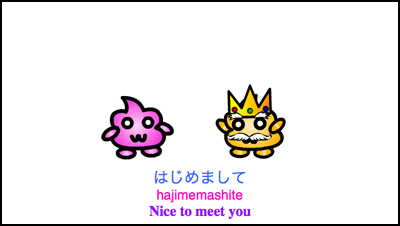
………………………………………………………………………………..
Number 2:

★ In today’s video we learned how to use this phrase to tell someone our name.
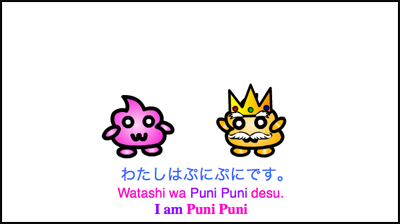
………………………………………………………………………………..
Example:
If your name is Sara, you can say:
わたしはサラです。
Watashi wa Sara desu.
“I am Sara.”
You can also leave out “Watashi wa” and just say “Sara desu.” Japanese often leave out the topic of the sentence when it is obvious to both people.
………………………………………………………………………………..
★ This sentence form can also be used to tell someone anything about you. Just like you use “I am___” for many kinds of sentences in English, you can use this sentence to say many different things in Japanese.
Example 1:
You can use this sentence form to tell your nationality
わたしはアメリカじんです。
Watashi wa Amerikajin desu.
“I am American.”
Example 2:
You can use this sentence form to tell your age
わたしは15さいです。
Watashi wa juugosai desu.
“I am 15 years old.”
………………………………………………………………………………..
★ Another phrase you can use to tell someone your name is:
わたしのなまえは_____です。
Watashi no namae wa ________desu.
“My name is__________.”
Example:
If your name is Sara, you can say….
わたしのなまえはサラです。
Watashi no namae wa Sara desu.
“My name is Sara.”
………………………………………………………………………………..
★ Some other ways to tell your name include:
わたしは_____といいます。
Watashi wa ________ to iimasu.
“My name is__________.”
わたしは_____ともうします。
Watashi wa ________ to mōshimasu.
“My name is__________.”
………………………………………………………………………………..
Number 3:
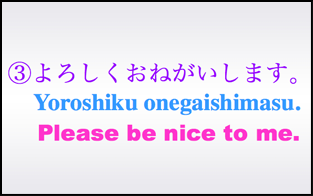
★ Although we don’t say this in English, this is a very common and important phrase to remember in Japanese.
★ This is usually the last phrase that Japanese people use when they introduce themselves.
★ A more casual version of yoroshiku onegaishimasu is yoroshiku.
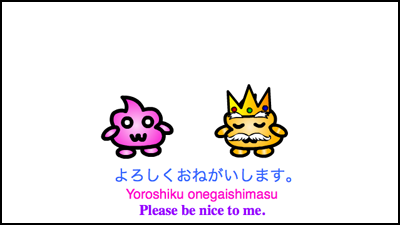
………………………………………………………………………………..
Conclusion:
There are a lot of different phrases that you can use to introduce yourself in Japanese, but you don’t have to remember them all. If you can remember the three phrases that we learned in today’s video, then you can introduce yourself in Japanese!
………………………………………………………………………………..
Self Introduction – Madoka Magica
はじめまして。
あけみほむらです。
よろしくおねがいします。
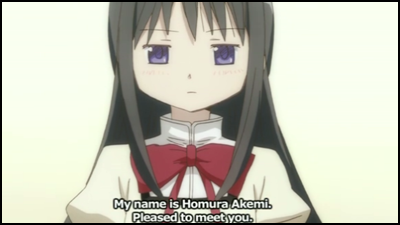
………………………………………………………………………………..
Do you want a Japanese tutor?
Take Japanese Skype Lessons with Professional Japanese Teachers on kakehashijapan.com!
………………………………………………………………………………..
………………………………………………………………………………..





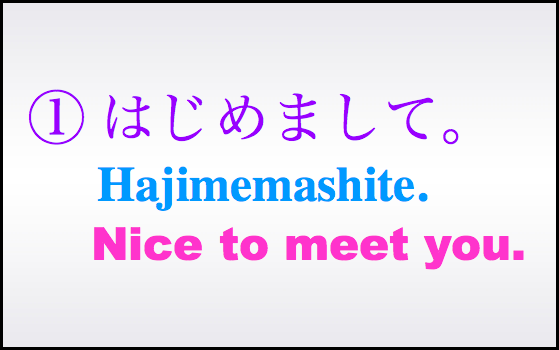
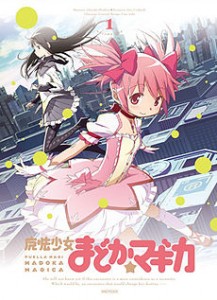


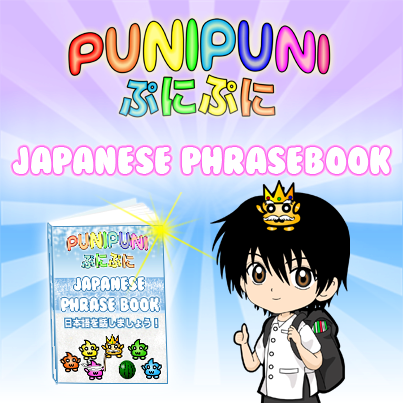

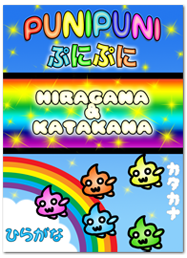
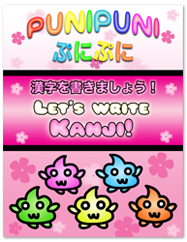
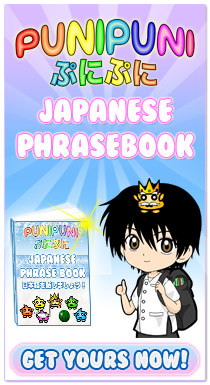

14 comments
I love this! Out of all the programs that I use to learn Japanese, this is the most effective and the cutest :3ve
Comment by Esha on 10/11/2012 at 6:55 pmうれしい!\(◕ω◕)/♥ We are happy that you like us! We will do our best for you! これからもよろしくね!
Comment by PuniPuni on 10/13/2012 at 10:07 amこれからもよろしくね!
Comment by Han on 07/01/2013 at 8:05 amkore kara mo yoroshiku ne!
what does that mean?
gomen. i’m still starting to learn. ^^
これから (kore kara) means “from now on” (literally “from this”) and も (mo) means “too” or “also” so これからもよろしくね!(kore kara mo yoroshiku ne!) translates to something like: Please treat me kindly from now on too! It implies that the two will be working together (or associating with each other) more in the future and shows their will for positive interactions to continue in the future \(◕ω◕)/♥
Comment by PuniPuni on 07/01/2013 at 5:47 pmありがとう~!!ぷにぷに^^ understood
Comment by Han on 07/02/2013 at 7:34 amMy only issue with this class is that I have no idea of how to write my name in japanese 🙁
Should it be ‘beatorizu’?
Comment by Beatriz on 12/06/2013 at 3:17 pmIt’s hard to know without hearing your name said out loud, but it would probably be written like this: ビアトリズ (biatorizu). (◕ω◕)b☆
Comment by PuniPuni on 12/11/2013 at 7:43 amスみません Why is the hiragana for ‘ha’ (は)used when you say ‘wa’(わ)in the phrase ‘watashi wa’?
I love the website very much and the videos are excellent. It is great to be taught by a native Japanese speaker.
Comment by Cliff on 12/14/2013 at 5:41 amWhen は is used as a particle, it is pronounced “wa.” But, any other time it is used like as part of another word (for example はな – flower) it is pronounced “ha.” All words except the particle that have a “wa” sound in them (like watashi) use the hiragana わ.
So, は has two ways of being read (ha or wa), but わ only has one (wa). (◕ω◕)☆
Comment by PuniPuni on 12/19/2013 at 3:30 ami just has one doubt..i think there is 2 ”konnichiwa” one for hello and another for afternoon ?? is it?
Comment by varsha on 05/21/2014 at 7:51 amKonnichiwa can be used from noon until before evening. So, it is actually most similar to the English expression “Good afternoon.” However, it is also translated as “hello.” Please check out this lesson to learn more: http://www.punipunijapan.com/punipuni-lesson2-hello/
Comment by PuniPuni on 05/23/2014 at 8:16 pmThank you very much for your awesome simple useful tutorial about introducing in Japanese 😀 😉
Comment by Parham on 11/06/2014 at 3:03 amHajime mashite.. I have no idea how to write my name.. could you help me..
Comment by Prasanna on 12/16/2014 at 11:42 amI am not sure how you pronounce your name, but I think it would probably be written like this: プラサンナ (purasanna)
Comment by PuniPuni on 01/06/2015 at 7:19 am